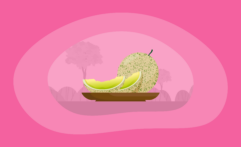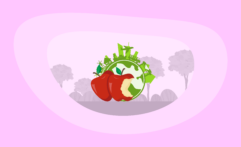Can Dairy Farming Be Ethical? Here Are the Facts
Impactful Ninja is reader-supported. When you buy through links on our site, we may earn an affiliate commission.
Learn more
Learn more
.
Hey fellow impactful ninja ? You may have noticed that Impactful Ninja is all about providing helpful information to make a positive impact on the world and society. And that we love to link back to where we found all the information for each of our posts. Most of these links are informational-based for you to check out their primary sources with one click. But some of these links are so-called "affiliate links" to products that we recommend. First and foremost, because we believe that they add value to you. For example, when we wrote a post about the environmental impact of long showers, we came across an EPA recommendation to use WaterSense showerheads. So we linked to where you can find them. Or, for many of our posts, we also link to our favorite books on that topic so that you can get a much more holistic overview than one single blog post could provide. And when there is an affiliate program for these products, we sign up for it. For example, as Amazon Associates, we earn from qualifying purchases. First, and most importantly, we still only recommend products that we believe add value for you. When you buy something through one of our affiliate links, we may earn a small commission - but at no additional costs to you. And when you buy something through a link that is not an affiliate link, we won’t receive any commission but we’ll still be happy to have helped you. When we find products that we believe add value to you and the seller has an affiliate program, we sign up for it. When you buy something through one of our affiliate links, we may earn a small commission (at no extra costs to you). And at this point in time, all money is reinvested in sharing the most helpful content with you. This includes all operating costs for running this site and the content creation itself. You may have noticed by the way Impactful Ninja is operated that money is not the driving factor behind it. It is a passion project of mine and I love to share helpful information with you to make a positive impact on the world and society. However, it's a project in that I invest a lot of time and also quite some money. Eventually, my dream is to one day turn this passion project into my full-time job and provide even more helpful information. But that's still a long time to go. Stay impactful,Affiliate Disclosure
Why do we add these product links?
What do these affiliate links mean for you?
What do these affiliate links mean for us?
What does this mean for me personally?
![]()
Dairy is a staple in many households all over the world. From a splash of cream in a cup of coffee to a dash of milk with cereal, it cannot be denied that we have become big consumers of dairy products. In this age of information readily waiting at our fingertips, people have also started to become more ethical consumers. So we had to ask: Can dairy farming be ethical?
Dairy farming can be ethical so long as farmers do not mistreat their animals, offer an environment that allows normal activities, and keep the use of hormones and antibiotics to a minimum. Look for local, family-owned, or CertifiedHumane farms – and stay away from factory farms.
It seems the most unethical dairy farming is found within factory farms and big productions. Their common goal is to produce as much dairy as efficiently as possible, despite the detrimental effects this might have on the dairy cows, as well as the environment. There is a clear disconnect between the knowledge that cows are intelligent creatures and the way that they’re treated in these factory farm conditions.
The Main Problems to Overcome to Make Dairy Farming Ethical
It’s easy to imagine the picturesque sight of cows roaming the green grassy fields, calves running around them playing, and the farmer milking the cows every now and then. It is a peaceful image, and one many people expect from all dairy farming, but really, this is the type of life only ethical farms provide for their cattle. The reality of factory farms is quite different.
Housing: For factory farm cows, grazing in the grassy fields is just a dream. In reality, cows are kept in small tie-stalls, rarely being let outside to graze, and forced to go without exercise and socialization. Not only is this a terrible way to live, but the cows that are kept indoors this way are also at an increased risk for several uncomfortable and deadly diseases.
Diseases: One of the many killers of factory farm cows is mastitis, a painful infection of the udder, which kills more than 16.5% of all dairy cows. This infection is brought on by a mix of poor hygiene from bad living conditions, as well as overmilking. Lameness, a condition that is both uncomfortable and painful, is also a common condition for factory farm cows, despite the fact that it can be prevented by simply letting the cows exercise daily.
Pregnancy and calves: In order for cows to produce milk, they need to have given birth. While this in itself is perfectly normal and natural (just like with humans!) it is twisted into something horrifying when it comes to factory farms: Dairy cows are forced to be impregnated every year in order to keep producing milk, and their calves are taken away shortly after birth, causing distress to both the mother and the calf. Calves that are male will usually be killed, sold as veal, or used for breeding.
Overproduction: The 10 million dairy cows found in North America produce around 7 gallons of milk every single day. This might not seem like a large number to some, but once you know that a calf only needs around 1 gallon of milk every day, the difference is staggering. In order to produce this large amount of milk, the cows are given a growth hormone called rBST, which increases the risk of them suffering from lameness, mastitis, and a range of other illnesses.
Environmental impact: Because of the factory farm trend of keeping a lot of animals in very small areas, there is bound to be a high amount of manure that, when used on the land in an overabundance, can pollute both the water and air of that particular area.
How Are Ethical Dairy Farms Different?
When you know what factory farms look like, it seems like any other conditions for cows would probably be more ethical. But what does an ethical dairy farm look like in reality?
The Grass is Greener (and available to eat!): Here, the dairy cows are allowed to roam. They can run around in the fields to their heart’s delight, graze on the green grass, and have the opportunity to socialize with their herd. Did you know that cows are actually highly intelligent creatures, who form bonds with their fellow cows and even have best friends?
Health is Important: Ethical farms already have healthier cows in that they let them exercise and graze. From the extra time outdoors, comes the lowering of a mass of health risks and stress. In addition, the lack of use of the bovine growth hormone allows the dairy cows to produce the amount of milk that their udders are built for. Overall, a much more comfortable existence!
Mothers and Calves: Unlike the factory farms, at ethical farms, the calves and mothers get to know each other. Farms with a CertifiedHumane certification, allow the calf five weeks with its mother, where it will slowly be weaned off her milk.
Caring for the animals: One thing to also note is the training of the people working at ethical farms. In order to receive important certifications, like CertifiedHumane, the farmers and workers are required to have a high level of training when it comes to handling animals, making sure to provide proper and genuine care, as well as provide the least stressful type of transport when needed.
Less manure, more soil fertility: In smaller productions, the manure produced by dairy cows can actually help the environment, by providing soil fertility to the land and creating a positive cycle of cows feeding the land that also feeds them. It’s all about quality over quantity!
What Are Examples of Ethical Dairy Farms
Thankfully, ethical dairy farms do exist.
One of such places is the Long Dream Farm in Northern California, a family-owned, no-slaughter dairy farm, where the owners know the names of each individual cow. In an interview with Civileats, the owners explain their philosophy of dairy production as “seeing the cows as their partners in food production”. Especially heartening is the fact that calves and mothers are allowed to spend the first nine months of the calf’s life together. This family-owned business really just wants their animals to have long and happy lives.
Another such farm is the Organic Pastures Dairy Company in Fresno, California, first established in the 1950s by the McAfee family. It is still run by the family today and has the general philosophy that they always put the cows first. They are very open about how they care for their animals and even offer guided tours for those who are interested in seeing more of their dairy production.
There are many more ethical dairy farms out there – the CertifiedHumane website has a list of every farm with their certification, which can be found right here.
A Tale of Animal Welfare: How Dairy Farming Is Unethical
Several animal activists have stood up against the unethical practices occurring throughout dairy production, and we’ve seen a rise in public concern, as well. But it isn’t the entire dairy industry at fault; there are both ethical and unethical dairy farms in operation all over the world. Still, the unethical farms are spoiling the reputation of the whole lot.
So How Should We Debate This?
University of British Columbia professor Marina von Keyserlingk believes the science of animal welfare, where animals and people come together, is socially mandated. There are two sides to animal welfare: the animals in our care and the people involved. The most obvious people involved are the farmers, but veterinarians and the public are also.
The requirements of animal welfare, according to von Keyserlingk, are positive experiences, good health, and natural living. But these things must be discussed in the framework of sustainability. A solution only works if it is environmentally friendly, economically reasonable, and socially acceptable, and there must be a balance among these.
Fundamentally, animal welfare questions whether we should do something, not if we can do something. At the same time, being able to do something doesn’t necessarily mean you have the social license to do it. Certainly, this rationale questions the ethics of actions by animal activists, vegan extremists, and others fighting to end dairy.
For example, ‘natural living’ doesn’t necessarily mean cows will always be sent out to pasture–which is simultaneously what most people think it means and most animal activists demand. This concept concerns itself with the environmental changes necessary to allow the animals to express natural behaviors.
A farmer is more likely questioning, “Can the cows walk naturally in the barn? Will installing friction flooring allow a more natural gait?” As it were, these kinds of thoughts and decisions can be considered just as ethical as allowing access to pasture.
Still, as Dr. von Keyserlingk has also pointed out, there will always be a small part of the public that will remain unsatisfied no matter what is done to improve the dairy industry. But the best thing we can do is work toward finding solutions that can shape best practices and assist farmers in doing what is ethical.
But What About Factory Farming?
The development of factory farms has been one of the worst things to happen to the entire agricultural industry. It has turned many farming practices into extreme, unsustainable, unethical versions of what they once were.
The high-volume production centers are guilty of animal cruelty in several forms. For example, dairy cows are repeatedly impregnated and made to provide milk continually. And every time, their calves are taken from them within hours (causing additional stress and grief). All of this takes an enormous toll on the cows’ bodies, making them obsolete in the eyes of milk production in just a few years, at which point the cow is slaughtered for meat.
Additionally, animals in these large Concentrated Animal Feeding Operations (also known as CAFOs) keep animals in restricted quarters. Many animals obtain diseases or injuries and are left to suffer without proper treatment. All in all, their lives are short and miserable. And for the sake of ethical dairy, these cruel farms should just be eliminated.
But this isn’t to say that unethical practices don’t occur on non-factory farms because they can, and they do. Although, issues arise to a much lesser extent and only within a tiny fraction of organic and private farms. Many small dairy farmers have little money and resources–much less than most corporate-owned factory farms, and they have every reason to take good care of their animals since they are their source of income and means of survival.
Where Is the Balance for an Ethical Dairy Industry?
The two most-studied animal welfare topics regarding ethical dairy farming have been pasture access and calf-cow separation. Going back to Dr. von Keyserlingk, her research focuses on what is important to people. She set up a forum where people could express their opinions regarding these two areas.
Participants included dairy producers, farm veterinarians, and members of the public who labeled themselves as students, teachers, animal advocates, or generally “non-dairy.” Here are some highlights of that survey.
What People Say About Pasture Access
When asked if cows should have access to pasture, 90% of participants said “yes,” while 10% considered themselves “neutral.” Farmers even favored access to pasture, but some noted they would like to but were unable for some reason. Nonetheless, farmers and veterinarians were both concerned that lactating cows couldn’t receive all their required nutrients for milk production with pasture alone.
Survey responses were also reflective of people having a belief that cows prefer being out on pasture. Yet studies show that cows tend to choose to be comfortable and go where it is cooler. When given a choice, cows often stayed outside in the evening but remained in the barn, where it was cooler, during the day. What’s more, cows without pasture access had no differences in their milk production than cows with access.
This suggests that instead of asking if the pasture is important to cows, we should ask what aspects of the pasture are important to them. Perhaps we can find solutions that bring the pasture to the cows and develop ways to mimic a more natural living environment within the barn? Dr. von Keyserlingk and all her team members of the UBC Animal Welfare Program feel this idea has a lot of promise and are currently researching it.
What People Say About Separating Calf-Cow Separation
When the survey group was asked if the dairy cow and her calf should be separated within the first few hours of birth, all 100% of veterinarians said “yes,” citing that calves were at risk of numerous diseases otherwise. Farmers mostly said that they did separate the animals, though many do not enjoy doing so.
When it came to the public, virtually all animal advocates and most in the non-dairy group voted against separation, opposite of those within the industry. And whether yes or no was voted, many cited disease as a concern, but it argued the other direction. For example, many said calf separation causes stress, which makes the animal more vulnerable to disease.
Indeed, dairies struggle with calf mortality and transition cow diseases; but there isn’t any research proving that separation impacts either of these issues. Many questions need to be answered with a view that goes beyond milk production. However, as we’ll see in a moment, we already have practical research being done on the ground by the farmers themselves.
Final Thoughts
Dairy farming can be ethical, especially when it comes to smaller farms and family-owned businesses. While we should expect to see more of these ethical dairy farming practices emerge, that doesn’t mean we should rely on these few ideas alone to create an ideal industry. Continued research–by scientists, activists, and farmers alike–will help us identify which methods are most sustainable and resonate with the values of today’s society.
Still, if you wish you be ethical when it comes to dairy, supporting your local small businesses (especially the ones with a CertifiedHumane certification) seems to be the best way to go. And hey, it is always good to support the local economy!
Stay impactful,

Sources
- About conscious consumers
- Facts on Factory Farms
- The Certified Humane brand
- Welfare issues for Dairy Cows
- Report on Animal Welfare in Dairy Industry
- Report on Animal Agriculture and the Environment
- Information on Dairy Cows
- Cows Have Best Friends Too!
- The Standards of CertifiedHumane
- CertifiedHumane Dairy Cattle Standards
- The Long Dream Farm
- Civileats Interviews Owners of The Long Dream Farm
- The Organic Pastures Dairy Company
- Overview of Businesses with the CertifiedHumane certification
- The FARM program
- The University of British Columbia – Faculty of Land and Food Systems: Marina von Keyserlingk
- Progressive Dairy: The future of dairy: What is the ideal dairy farm?
- Green & Growing: Factory Farming: Bad For The Animals, Humans, and The Environment
- Farm and Dairy: Got Ethics? U.S. dairy industry: ‘Yes, we do.’
- UBC Animal Welfare Program – Homepage
- The Ethical Dairy – Homepage
- Farmers Weekly: Ethical ‘cow-with-calf’ dairy targets premium market
- Farm Drop: How Dairy Farming Is Becoming More Ethical




